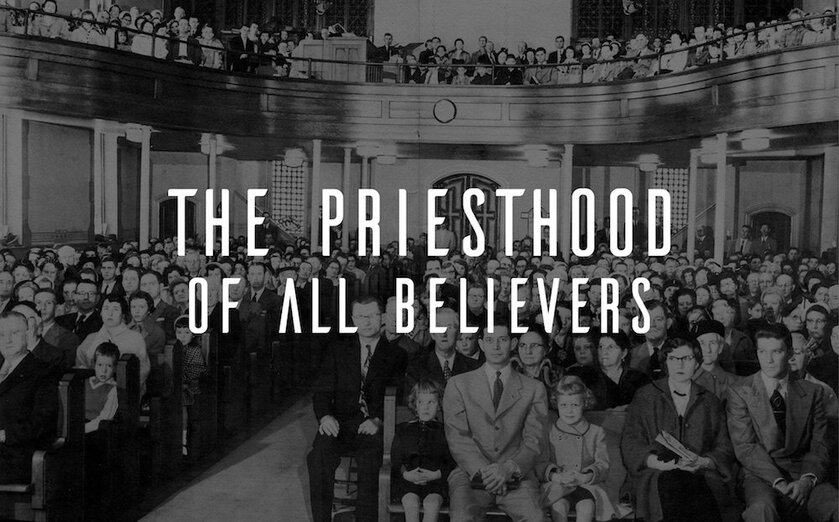Lean into Active Listening as a Spiritual Discipline
Roman 11:33-36
"Oh, the depth of the riches and wisdom and knowledge of God! How unsearchable are his judgments and how inscrutable his ways!"
"For who has known the mind of the Lord, or who has been his counselor?"
"Or who has given a gift to him that he might be repaid?"
"For from him and through him and to him are all things. To him be glory forever. Amen."
If God wanted me to have the things so many others desire, and to do what some do, He would have given those things to me. For "the gifts and the calling of God are irrevocable." (v. 29) And so I shouldn't be jealous or offended by others who seem to prostitute their God-given gifts. And I certainly shouldn't use the gifts God has blessed me with in order to elevate my own situation.
Romans 12:3
"For by the grace given to me I say to everyone among you not to think of himself more highly than he ought to think, but to think with sober judgment, each according to the measure of faith that God has assigned."
The Bible warns against people who names things after themselves. The Bible encourages humility and giving glory to God instead (1 Corinthians 10:31). God has a purpose for every part of his body, whether it's the Presbyterian; the Baptist, Roman Catholic, Orthodox, Congregationalist, Methodist and so on, we are not all called to the same ministry. All of this underscores that humans cannot claim to rival God’s wisdom or earn His favor through their own efforts. This sets a foundation for humility: no one can boast before God, as all we have is from Him. The gifts He gives are not for personal aggrandizement but for His glory and the building up of His body (the church). The misuse of His gifts can manifest in seeking fame, wealth, or status, sometimes symbolized by naming things after oneself to claim credit or legacy.
When individuals or denominations seek to elevate themselves above others, perhaps by branding their works in a way that emphasizes their name over God’s mission, they risk fracturing the unity of the body and prioritizing self over service. As I said before, not everyone is called to the same ministry, but all are called to serve in humility, using their gifts to edify the body and glorify God.
James 4:6 quotes,
"God opposes the proud but gives grace to the humble,"
emphasizing that prideful self-promotion is contrary to God’s will. Probably channeling Jesus’ teaching in Matthew 6:1-4 about doing good deeds in secret, not for public recognition, and further underscoring Jesus' call to humility.
And so the apostle Paul is telling us that knowing God's will for our lives has to do with surrendering our lives to God's sovereignty. To not be conformed to the ways of the world. So it's in that commitment of ourselves to God's will and grace where we find our purpose.
Romans 12:1-2
"I appeal to you therefore, brothers [and sisters], by the mercies of God, to present your bodies as a living sacrifice, holy and acceptable to God, which is your spiritual worship [rational service]. Do not be conformed to this world [this age, these times], but be transformed by the renewal of your mind, that by testing you may discern what is the will of God, what is good and acceptable and perfect [will of God]."
The rhetorical questions ("Who has known the mind of the Lord?" and "Who has given a gift to him that he might be repaid?" ) remind us that human efforts cannot rival or manipulate God’s plans. We shouldn't be making a business of finding faults and conflicts among the body. Romans 12 calls believers to think with "sober judgment". When individuals or denominations prioritize their own name or brand over God’s mission, they risk falling into pride. I've been there, I've expressed my opinions and beliefs in such a way that I wasn't necessarily walking in love, demonstrating Christ.
Paul appeals to us that we should present our bodies as "a living sacrifice", it's a call to total surrender, offering our entire lives (our gifts, callings, and works) to God’s service. So why are we using those gifts to debate, to strive against each other?
These truths should humble us, especially when we’re tempted to elevate our own perspectives, doctrines, or identities above others in the body of Christ. When we engage in fault-finding or contentious debates, we risk assuming we have the full picture of God’s will, which Paul explicitly warns against. Instead, recognizing our limited understanding should lead us to humility and reliance on God’s wisdom. And no matter how many decades of bible study and reflection I participate in, this lesson must be learned again and again.
And thankfully, Paul lays out just exactly how we, the people of faith, must live with one another (Romans 12:3-21) in order to accomplish God's will. In Romans 12:3-8, Paul emphasizes humility and the proper use of God-given gifts within the body of Christ. Believers are urged to think with "sober judgment," avoiding pride and recognizing that their faith and abilities come from God’s grace. The church is described as one body with many members, each with unique functions. Paul lists various gifts, prophecy, service, teaching, exhortation, giving, leadership, and mercy, and encourages believers to use them faithfully according to the grace given. These gifts are to be exercised humbly and purposefully to edify the body, not for personal glory, emphasizing unity in diversity.
In Romans 12:9-21, Paul outlines the characteristics of genuine Christian living, centered on love and humility. Believers are called to show sincere love, reject evil, and cling to good. They should prioritize brotherly affection, honor others above themselves, and serve the Lord with zeal. Paul encourages perseverance in hope, patience in trials, and constancy in prayer, as well as generosity and hospitality toward others. Christians are to bless, not curse, those who persecute them, empathize with others’ joys and sorrows, and live in harmony, avoiding pride and vengeance. Instead of repaying evil with evil, they should do what is honorable, seek peace, and overcome evil with good, trusting God to handle the justice thing.
Both passages emphasize humility, unity, and love in using God’s gifts and living as Christians. Together, they call believers to surrender their lives to God’s service, fostering unity and reflecting Christ’s character in all our actions.
Read through the entirety of chapter 12 and then reflect on the specific gifts God has given you (teaching, preaching, encouragement, or service). And ask yourself, "Am I using these gifts to edify others or to elevate myself?"
For example, if you’re gifted in teaching, ensure your words point others to God’s truth rather than showcasing your own knowledge. Have you ever mocked another for their lack of knowledge and understanding? Maybe next time, before sharing opinions, pause to pray, asking God to guide your words so they build up the body rather than cause strife. If you’re involved in a ministry or project, consider whether its "branding" (its name or focus) glorifies God or draws attention to individuals and their ideas.
"Everyone is called to the same ministry", each gift contributes to the whole, and prideful competition disrupts this unity. If you find yourself frustrated with other denominations or believers, remember from God's perspective their role in the body is just as valid. Is it fulfilling God's will in perfect harmony with his word or being guided by the Holy Spirit? Maybe, maybe not. If you’re tempted to critique another group’s approach, practice Romans 12:16 ("live in harmony with one another" ) by seeking to understand their perspective. Edify, educate, exhort, and exhaust yourself in fervent study, but also exhale, exhaust yourself in every good way, and exercise love for one another. Try redirecting conversations toward shared goals, like spreading the gospel or serving the needy, to reinforce unity.
It's real easy to write these things, and it's extremely hard to do them. The command to "let love be genuine" and "outdo one another in showing honor" directly addresses this. Loving others, even amidst disagreement, is a mark of true Christian character. When you feel the urge to debate or correct someone, recall Romans 12:14 ("bless those who persecute you" ) and Romans 12:18 ("live peaceably with all" ). This might mean choosing silence over argument or offering a kind word instead of criticism.
For example, if you’re in a discussion about theology, focus on asking questions to understand others’ views rather than proving your own. I can honestly say that I do practice this humility. Being an active and honest listener is something I truly strive for.
When you encounter division or criticism in the church, whether directed at you or others, resist the temptation to retaliate or escalate. For instance, if someone challenges your beliefs harshly, respond with grace. What that grace looks like is up to you. Maybe pray for them, maybe meeting some practical need for them (Romans 12:20: "if your enemy is hungry, feed him" ). If you’ve been hurt by denominational disputes, focus on forgiving and serving those involved, again trusting God to handle the justice thing.
Make a daily habit of surrendering your opinions, gifts, and interactions to God. For example, start your day with a prayer like, "Lord, let my words and actions today glorify You, not myself." When tempted to engage in a heated debate, recall Romans 12:2 and ask God to renew your mind, helping you discern whether speaking up serves His purpose or your ego. This surrender can guide you to use your gifts in ways that foster peace and unity, rather than fueling strife.
I say these things as much for myself as for all. I know these things in my mind, but my spirit has a different mindset.
Q: What does my mind know?
A: Listening honors others and fosters empathy.
Q: Then why don't I do it in every situation?
A: The disconnect between what our minds know and what our spirit does stems from the tension between our renewed mind and our human nature. Both exist within every Christian, even Paul admits that (Romans 7:15-25).
When you’re tempted to debate or correct someone, emotions like frustration, pride, or defensiveness may arise, overriding your intent to listen humbly. Emotions like anger or despair are not sinful in and of themselves but can lead to sin when we dwell on them or act on them detrimentally. For example, if someone challenges your beliefs, your spirit might react with a desire to defend yourself rather than pause to listen, even though your mind knows listening is the Christlike response. Acknowledge these emotions as natural but surrender them to God. Your spirit’s "different mindset" may reflect ingrained habits or worldly patterns that conflict with your renewed mind. Your own spirit can haunt you if you aren't careful to resist. In a culture that values being right or winning arguments, your instinct might lean toward asserting your perspective rather than listening, especially in heated moments. Try intentionally practicing listening as a countercultural habit. For instance, in your next conversation, set a goal to ask at least one question to understand the other person’s view before responding. Embrace this as a growth opportunity. And when you catch yourself failing to listen empathetically, don’t despair, instead, confess it to God "God forgive me for the times I have acted on my emotions in a way that displeased you."




















